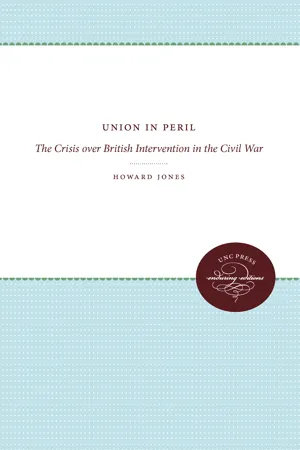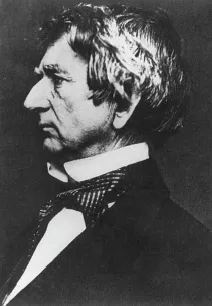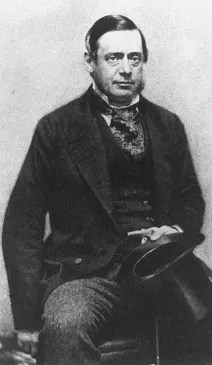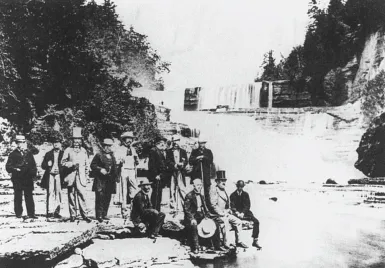1: Problems of Recognition
The most simple, if not the only way, would be to recognize the Southern Confederacy.
—Lord Lyons, March 26, 1861
For many reasons, the possible British recognition of the Confederacy constituted the most dangerous issue confronting the United States and England during the Civil War. If Southern independence were formally acknowledged, the Confederacy would acquire nationhood and win access to British ports and purses as well as the right to negotiate military and commercial treaties. From the Union’s perspective, recognition would undermine its arguments about the sanctity of the Constitution. Indeed, England’s granting of recognition might compel France and other European nations to do the same. Accompanied by military and commercial alliances, such action might guarantee the triumph of secession. Even an offer of mediation or a call for an armistice would raise Northern objections because either move implied the existence of a Southern entity, if not a nation. Any effort at intervention by England—including making its good offices available—would be especially unwelcome because of the widespread feeling in the North that the British regarded a divided republic as presenting an opportunity to rearrange the North American balance of power. Were they not already strategically situated to the north in Canada and to the south in the West Indies? Would they not seek to expand their maritime power at the expense of a United States torn apart by war? When England declared neutrality during the Civil War and thereby extended belligerent status to both antagonists, the Union’s leaders suspected that formal recognition of Southern independence was at hand.1 So perilous did this prospect seem that the Lincoln administration warned England of war if it took that step.
SHORTLY AFTER assuming his duties as secretary of state, Seward expressed some of his concerns to Lyons. The Union, Seward confidently declared, intended to avoid the use of force against the rebels. Warding off the crisis at home for three months would foster a “counter-revolution” of Union sentiment that would probably begin in Texas and spread throughout the South. The North would facilitate this trend by interrupting the South’s trade with England and other countries. Seward and Lyons were a classic study in contrasts. The secretary of state could be calm and gracious, but most contemporaries knew him as brash and outspoken, explosive in temperament, impulsive in action, and so anti-British that, as one contemporary put it, he appeared to be “an ogre fully resolved to eat all Englishmen raw.” Lyons was cool and aloof, almost distant, and convinced that Americans were unable to refrain from violent behavior if the opportunity arose. The British must not buckle under to America’s customary displays of aggressive behavior or the Union’s demands for concessions would have no limits. The British would do nothing to prolong a war or prevent reunion, but they could not be held responsible for the outcome, he declared to Seward, if the Union interfered with British commerce. Some Englishmen might be placated by cotton secured overland through Northern ports, but others would not. If British ships were barred from Southern ports, the London government would undergo great pressure to open them as a matter of legal right—perhaps even by war. The British would act within international law, and on this point, Lyons wrote Russell in London, “it certainly appeared that the most simple, if not the only way, would be to recognize the Southern Confederacy.2
William H. Seward, U.S. secretary of state (National Archives)
On the evening following their meeting of that day, March 25, Seward’s attitude abruptly stiffened into the behavior Lyons had come to expect—an outgrowth, he thought, of the secretary’s discussions that afternoon with hard-line members of Lincoln’s cabinet. At a dinner party attended by Lyons along with several of Lincoln’s advisers, French minister Henri Mercier, and Russian minister Edouard de Stoeckl, Seward became engaged in an animated discussion with Mercier and Stoeckl and waved Lyons to join the small circle. All three ministers gathered around Seward and assured him that in the event of North-South hostilities they would make every effort to protect the trade of their own nations. The secretary responded with a stern warning: “If one of your ships comes out of a Southern Port, without the Papers required by the laws of the United States, and is seized by one of our Cruisers and carried into New York and confiscated, we shall not make any compensation.” Stoeckl, according to Lyons, argued “good- humouredly” against this position by insisting that for a blockade to be legal it must be effective. Seward rejoined that this maritime action did not constitute a blockade. The Union’s problem was domestic in nature, and its cruisers would act under municipal law in lying off the Southern coast to collect duties and enforce customs laws. Lyons thought the measure a thinly disguised paper blockade and warned that the attempt to enforce revenue laws would place outside nations in the dilemma of either extending recognition to the South or submitting to violations of their commerce. At that point Seward, half hidden by his own cigar smoke, launched into a tirade against foreign nations and uttered statements that Lyons said would have been “more convenient for me not to have heard.”3
Lord Lyons, British minister to the United States (Lord Newton, Lord Lyons: A Record of British Diplomacy, 2 vols. [London: Edward Arnold, 1913], i:frontis.)
Alarmed by Seward’s threat against British trade, Lyons urged Russell to maintain a flexible position toward the impending American conflict, while attempting to restrain Seward by establishing some form of cooperative arrangement with France. Such an understanding, Lyons had earlier argued, might discourage Seward from taking some rash action, particularly if the decisions reached by the governments in London and Paris were firm and judicious. Commercial interference by the Union might be prevented by fear that it would produce recognition of the South. But, Lyons added, “I am afraid we must be prepared for it.” It seemed advisable to leave British policy in doubt. He became convinced over the next few months that Seward sought political gains by threatening Europe. A foreign war would not reunite North and South, Lyons assured Russell. The minister intended to avoid antagonism while making Seward see that his conduct would achieve nothing. If war broke out, the British and French must be neutral. Lyons informed Russell that Mercier was receptive to a joint policy but wanted to go farther: perhaps both the British and French ministers should have “a discretionary power to recognise the South?” Lyons thought the outcome in America too uncertain to risk such a step. The imminence of recognition could bring war with the United States. Anglo-French cooperation offered the best preventative.4
Washington’s diplomatic corps. Secretary of State Seward entertaining dignitaries at Trenton Falls, New York. Seated, left to right: Molena, Nicaraguan minister; Seward; Baron Edouard de Stoeckl, Russian minister; Sheffield, British legation attaché. Standing, left to right: Donaldson of the State Department; unidentified; Secretary Bodesco of the Russian legation; Swedish minister Count Piper; Italian minister Bertenattie; Hanseatic minister Schleider; French minister Henri Mercier; Lord Lyons, British minister. (National Archives)
Seward played out his strategy, even though it was, albeit un-knowingly, pushing England and France together on the common ground of recognition of the South. The best response to the threat of foreign intervention, he thought, was a threat of his own. If he could convince Southerners that the danger from outside was greater than that posed by the North, all Americans might rally around the flag and resolve the sectional crisis. Further, such a show of national unity might ward off any attempts by European powers to exploit the American problem by renewing their expansionist efforts in the hemisphere. On April i Seward presented Lincoln with a memorandum containing striking proposals: the United States should demand that France and Spain explain their recent interventionist activities in Mexico and Santo Domingo, and if these explanations were not satisfactory, Congress should declare war on both European nations. Seward immodestly added, “I neither seek to evade nor assume responsibility.”5
This outlandish idea deserved the ill treatment it received. One can imagine the president’s reaction. Already confronting internal problems that could develop into external problems of unparalleled danger to the republic, he now had to deter his chief cabinet adviser from hurrying the process. Lincoln knew that Seward regarded himself as guarantor of the Union. When invited into the cabinet, Seward had expected to emerge as its leader. Now, Lincoln suspected, the secretary’s ill-advised plan to end the war constituted an attempt to dominate the cabinet and perhaps the administration itself. The president ignored Seward’s recommendations and made clear that if such actions must be taken he would do them. War with the Confederacy was less risky than war with Europe.6
With that matter settled, the Lincoln administration turned to another difficult assignment: it had to convince Europe that the internal troubles stemming primarily from slavery were not about slavery after all. For domestic reasons, Seward’s instructions to the new minister-select to London, Charles Francis Adams, avoided naming slavery as the issue underlying the American conflict. Had not Lincoln affirmed his opposition to intervention in slavery where it existed and sought to preserve the Union? Seward likewise opposed slavery without being an abolitionist, for he feared that a sudden end to slavery would disrupt the Southern economy and thereby undermine the entire republic. The South, Seward believed, needed the time afforded by gradual emancipation to adjust to a free labor economy. Both Lincoln and Seward also understood the dangerous domestic political ramifications of focusing on slavery as the source of the problem. Most Northerners did not like blacks and had no inclination to fight for them, and even larger numbers had no sympathy for abolition. An antislavery crusade might also alienate Unionists in the South as well as drive the border states of Maryland, Kentucky, and Missouri out of the Union.7
The British never understood the important relationship between American domestic politics and slavery, and Lincoln’s effort to dismiss slavery as the chief national issue had the unforeseen result of allowing them to focus on commerce rather than conscience. By bowing to domestic pressure and steering around the slavery issue, Lincoln relieved the British from having to make a decision between their moral commitment to antislavery and their economic interests in Southern cotton. With moral questions cast aside, economic considerations became paramount. Despite “all our virulent abuse of slavery and slave-owners,” one Englishman wrote, “we are just as anxious for, and as much interested in, the prosperity of the slavery interest in the Southern States as the Carolinan and Georgian planters themselves, and all Lancashire would deplore a successful insurrection of the slaves, if such a thing were possible.” The focus on commercial issues in Anglo-American discussions, in turn, increased the possibility of recognition of Southern independence.8
In reality, the Lincoln administration considered slavery the central cause of the crisis and counted on England to recognize the obvious. Both the president and his Republican party had taken a firm stand against the spread of slavery into new territories, thus pointing to its ultimate demise. Even though Lincoln placed the highest priority on preserving the Union, he considered the issues of slavery and Union to be inseparable. In this regard, he expounded a near mystical faith in American nationalism as opposed to sectionalism and states’ rights. For over seventy years the character of American democracy and republican government had hinged on the question of the nature of the union the Founding Fathers had established. Lincoln’s Inaugural Address had made his position clear: an abiding faith in the permanence and predominance of the Union necessitated the resolution of any issue that threatened its welfare. Though the president opposed slavery, he realized that the law protected its existence and sought, instead, to kill the institution by blocking its expansion. Southerners recognized this danger. Not by coincidence had the most explosive confrontations between North and South throughout the antebellum period related to slavery.
By the time war seemed certain, the two sections of the country had assumed the appearance of being distinctly different—one slave, one free. Slavery had become so much a part of the national debate that to many Northerners it easily became the chief stake in the war. Southern victory might prolong slavery’s existence for a time, but Northern conquest would force the liberation of nearly 4 million slaves in a bitter process that would raise the specter of race war. Among more than a few American observers, Seward joined Attorney General Edward Bates and Lincoln’s secretary John Hay in harboring such fears. If the British realized how deeply slavery had penetrated the American consciousness, they had little understanding of its inseparability from the question of the American Union. In a statement revealing his failure to grasp the relationship between slavery and union, Russell commented in late December i860 that he could not see how the North could allow slavery to exist. Russell was not alone in this belief; many Americans had demonstrated no more than a superficial understanding of the interrelated issues. At a White House dinner in late March of the following year, American dignitaries declared that the North was preparing to lead a war for emancipation and confidently agreed that England’s antislavery views would prevent it from helping the South build a nation based on slavery.9
Slavery was the great issue standing before the three principals—Union, Confederacy, and England—and yet no one seemed willing to address it. Although slavery was integrally connected to almost every issue leading to the Civil War, many Americans from both North and South sidestepped the peculiar institution and insisted that other matters were more decisive. Even for those who opposed slavery, the possibility of emancipation ultimately leading to racial equality proved too much to accept. Lincoln himself despised black bondage but never denounced white supremacy. In his Inaugural Address he had spoken for his party by declaring that he had no legal right to interfere with slavery where it already existed. Northerners and Southerners alike maintained that they sought to restore liberty—but the word had taken on so many qualifications and exceptions that neither side accepted the other’s definition. Charles Francis Adams believed that the Un...



